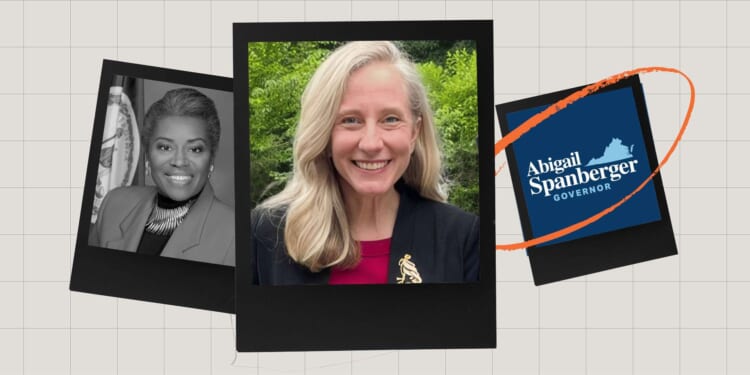Five years ago, as Democrats grappled with a disappointing congressional election that saw their House majority decline by more than a dozen seats despite Joe Biden’s win in the presidential election, then-Rep. Abigail Spanberger (D–Va.) voiced her frustration with the party’s lurch toward the political left.
If Democrats didn’t shift back toward the center, “we will get fucking torn apart,” she warned on a conference call with some of the Democrats’ top brass. “And we need to not ever use the words socialist or socialism ever again.”
History sometimes has a sense of humor.
On Tuesday night, as New York City was poised to elect a new mayor who had expressly embraced the socialist label and become a national champion for the far-left wing of the Democratic Party, Spanberger also emerged victorious. She will be the next governor of Virginia—and the state’s first female governor—after defeating Lt. Gov. Winsome Earle-Sears, the Republican nominee.
CNN called the race less than an hour after the polls closed, with Spanberger leading Earle-Sears by about nine points with 33 percent of precincts reporting.
It’s a result that, when paired with Zohran Mamdani’s likely victory in the other big race on this low-key Election Day, offers Democrats two divergent paths as the party heads into next year’s midterm elections and beyond. And while Mamdani’s win, like his campaign, gets more media attention, it is the result in Virginia that probably says more about what Democrats need to do if they want their party’s brand to be more viable on the national stage.
They can start by taking some lessons from how Spanberger has bluntly dissected the party’s recent troubles. During her three terms in Congress from 2019 through 2024, Spanberger earned a reputation as one of the most interesting and independent members of the Democratic caucus. She criticized her own party for failing to recognize that “inflation is a problem” in the wake of the COVID-19 pandemic and blamed Biden for overreaching politically. “Nobody elected him to be [Franklin Delano Roosevelt], they elected him to be normal and stop the chaos,” she told The New York Times in November 2021.
She walked the centrist walk as well. The Bipartisan Index, a ranking of members of Congress issued by the Lugar Center and Georgetown University, identified Spanberger as the 17th most bipartisan member of the House in 2023—as determined by her votes.
Bipartisanship isn’t always a good thing on its own merits, of course. As you might expect, some of Spanberger’s record is interesting to libertarians. During Biden’s term, she helped block a provision that would have required banks to report all transactions of $600 or more to the IRS, citing concerns about privacy. In 2021, she worked with a fascinating collection of lawmakers—including Reps. Barbara Lee (D–Calif.) and Chip Roy (R–Texas)—to get the House to repeal the 1991 Authorization for the Use of Military Force (AUMF) against Iraq (and an even older AUMF dating to 1957).
“We must be accountable to the American people and cannot abdicate this responsibility to open-ended AUMFs that give too much power to a President and don’t require Congress to take consequential votes,” she said in 2023 as she backed a similar bill. (Both the House and Senate have passed measures to repeal that authorization, but the process has still not been finalized.)
On the other hand, one of Spanberger’s biggest accomplishments in Congress was passing a bill to increase Social Security benefits for public workers who already receive pensions. It was a bipartisan effort, naturally, but it also blew an even larger hole in Social Security’s already leaky fiscal situation—and, as I wrote last year, it was fundamentally unfair.
As governor, Spanberger will quickly face at least one issue that will challenge her carefully crafted bipartisan persona.
Democrats expected to hold onto their majorities in both chambers of the state Legislature. Politics being what it is in the mid-2020s, one of the first things on the agenda in Richmond is not any kind of state-level policymaking but an attempt to influence federal politics with a mid-decade redistricting effort that could help flip the U.S. House of Representatives next year.
Asked on the campaign trail whether she would support a redistricting bill—along the lines of what California and Texas are already doing—Spanberger said last month that she would not oppose it. That’s despite previously saying that gerrymandering is “one of the largest issues plaguing our country.”
It’s the kind of zero-sum issue where there is no easy, bipartisan solution—one side will get what they want, and the other will not.
There is also another way to look at Spanberger’s win—not as a response to anything she’s done in office or on the campaign trail, but simply the result of being in the right place at the right time. Since 1977, the party that won the White House in the previous year has lost the Virginia gubernatorial election in every cycle but one—Democrat Terry McAuliffe beat Republican Ken Cuccinelli in 2013, a year after Barack Obama was reelected to the presidency. Maybe Spanberger just got lucky, as a Democratic candidate in a blue-leaning state with a lot of disgruntled federal workers and right across the Potomac River from a Republican in the White House.
But even if this election was more about national mood than anything specific to Virginia and Virginians, that might be even more of a reason for national Democrats to look to Spanberger rather than Mamdani for the path forward. After all, she’s won in an environment that looks a lot more like what next year’s midterms will.
Asked by The New Yorker about the meaning of Mamdani’s likely win in this year’s most-watched race, Spanberger offered a typically blunt assessment: “As a candidate to be the governor of Virginia, I don’t want to be disrespectful—like, I don’t care that much about what happens in the city of New York.”
Democrats elsewhere should adopt that same approach in the months and years ahead.

















